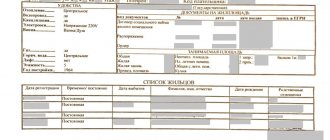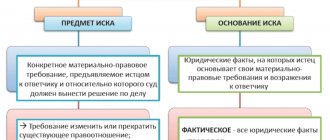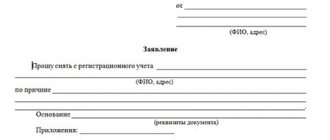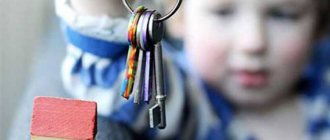Can a mother remove her son from the apartment without his consent? It would seem that this cannot happen. But, unfortunately, there are various family situations, including those that make living together simply impossible.
In this case, parents think about depriving negligent children of the rights to dispose of their shared living space and to live in it.
This can only be done through a lawsuit, provided that the child does not have his own share in the privatized housing.
What does registration of a citizen affect?
Registration in a specific housing gives a number of rights. Namely:
- Live in an apartment;
- Use the property located in the apartment and the common property of all residents of the house;
- Register as an individual entrepreneur;
- Issue a taxpayer number and pension certificate;
- Arrange benefits;
- Send your child to school or other educational institution;
- Apply for a job;
- Register your minor children and other relatives in this apartment (house);
- Give consent for other people to register at this address.
What sanctions will follow in the absence of registration?
After receiving a birth certificate, parents are required to register the child at their place of residence within seven days, i.e. make him permanent or temporary registration.
If parents do not intend to register their child, they bear administrative responsibility for violating the law and are required to pay a fine, the amount of which reaches 3.5 thousand rubles. In this case, the child will be denied access to kindergarten, school, child benefits, and medical services.
Can parents expel an adult child from the apartment?
An adult child can be discharged from an apartment only on the condition that he does not own part of the privatized apartment. Moreover, the discharge procedure itself is based on a court decision. This cannot be done under any circumstances without a court order.
Grounds for discharge of adult children
An adult child can be discharged from an apartment on the basis that he has stopped all ties with the family and, in fact, is no longer a member of it. This is described in Part 4 of Article 31 of the Housing Code. But blood relatives will remain formal family members, even if they do not maintain any relationship with it. This is the difference between the concept of kinship in the Family and Housing Codes.
The grounds for recognizing the fact of termination of ties with the family are:
- The child stopped participating in the joint household;
- It has its own budget and does not contribute to the general one;
- Does not provide support to other family members;
- Does not live in this apartment and does not pay for it. This is not the main condition, but a fairly significant additional fact that will also be considered by the court.
These conditions are specified in the Supreme Court decision No. 14 of July 2, 2009.
How to be discharged from a municipal apartment
You can leave an apartment issued for the use of the municipality from an adult son without his consent on the same grounds as from any other housing. The reason is always the same - lack of family relationships.
If an adult child has a share in the apartment
If such a tenant has his own share, he cannot be discharged by law. And this doesn’t make much sense, since he will retain his share in the living space, and he will still be able to dispose of it.
In such a situation, it is necessary to challenge the transaction itself, which gave the child a share in the property.
Is it possible to discharge without the father's consent?
If the parents are divorced and the child lives with his mother, then he can be discharged from his father’s apartment without his permission. To do this you need to file an application with the court.
Moreover, it is possible to discharge a child without the consent of the father if he is serving a sentence in prison or is declared mentally abnormal. But the mother, who has checked the child out of the father’s apartment, must register him in hers within 7 days.
Parent discharges son
It is not always possible to remove children from their living space. In some cases, the court will be against such actions:
- there is no permission from the guardianship authorities;
- the house belongs to the offspring as a property or he has a share in the real estate, for example, he was a participant in privatization;
- if a person is discharged without providing other housing in return or offering a smaller area;
- when the issues are controversial, the court will most likely take the side of the minor. If the issue is considered after 18 years of age, then the situation may have a different outcome.
To discharge children, you will need to provide a certificate from the BTI both from the previous place of residence and from the new one, where the adult child can be registered. You will also need a house register. The application review period will be two weeks.
In any situation, it is necessary to take into account all the nuances. Sometimes it would be a good idea to seek professional help from a lawyer. Only in such a situation can everything be done legally.
How to discharge an adult child from an apartment
Parents can remove an adult child from an apartment without consent by going through the following stages of the legal procedure:
- Pre-trial agreement. The parties should try to resolve the issue peacefully. But this does not always give results, and sometimes it is impossible, since the parents do not know about the whereabouts of the child and have no connection with him. In both cases, only the trial remains;
- We need to collect evidence for the court;
- It is important to correctly draw up a statement of claim, indicating all compelling reasons and evidence;
- Consideration of the case in court;
- The court will make a decision;
- If the decision is positive, the plaintiff will receive a copy of the court decision;
- This copy must be submitted to the Ministry of Internal Affairs;
- If the defendant fails to comply with the court decision, he will be forcibly evicted from the apartment.
Step-by-step instruction
So, how to expel children from an apartment without his consent if I am the owner:
- pay the state fee;
- collect a package of documents;
- take them to court;
- wait for the papers to be reviewed;
- appear at the scheduled meeting and confirm your requirements;
- wait for the court's decision;
- contact the bailiffs with a writ of execution to bring the decision into legal force.
How to file a claim correctly
The first step is to create the correct title for the statement of claim. The differences relate to the fact that the child lives in this apartment:
- If he does not live there, the claim should be titled as follows: on recognition as having ceased to use the housing;
- In the case of cohabitation - about recognition as having ceased to use and eviction from the apartment.
It is important to describe all the nuances of the case in as much detail as possible in the claim. It is worth referring to specific articles of the law. Therefore, it often makes sense to seek the help of a lawyer to draw up an application to the court.
The plaintiff may be one person, or all family members living in this apartment may be. If one of them files a claim, the rest will be witnesses in the case.
The claim must indicate the address of the defendant. This is, as a rule, the same apartment in which he is registered and from which they want to evict him. And even if he does not live there, a summons sent to this address will be considered delivered to the addressee. On this basis he will be evicted.
Copies of the claim are received by the plaintiff, defendant, court and third parties, who are considered members of this family acting as witnesses.
What are the initial steps?
Before going to court with an eviction claim, you must:
- contact the person subject to eviction in writing with a request for his voluntary discharge. That is, offer him to check out on his own (or with a demand to stop actions that violate the rights and interests of other citizens, if such actions are committed);
- contact the owner or landlord (depending on whether the apartment is privatized or municipal) with your complaint against the person being evicted;
- in some cases, it is necessary to contact the competent authorities with a statement about the violation of the rights of other persons by the evicted person.
Required documents and evidence
Along with the statement of claim for the removal of an adult child from the owner’s apartment, the following documents must be submitted to the court:
- Applicants' passports. If their interests are represented by a trusted person, then his passport and power of attorney;
- Documents on housing ownership rights. This may be a certificate of ownership or an extract from Rosreestr;
- A document confirming the receipt of the right to this housing. That is, a purchase agreement, equity participation, certificate of inheritance, deed of gift, etc.;
- Extract from the house register;
- Receipt for payment of state duty;
- Evidence in the case.
It is important to collect as much evidence as possible. Basic:
- Testimony of witnesses that the defendant does not live in this apartment. Witnesses are most often neighbors;
- Report on inspection of housing department apartment. The document usually indicates that the defendant’s belongings were not in the apartment, which proves that he does not live here;
- The same act drawn up by the district police officer;
- A certificate from the post office stating that no correspondence is received at this address addressed to the defendant.
State duty
To file a claim in this case, you need to pay a state fee of 300 rubles. The receipt must be filed with the court.
Time frame for resolving the issue
The process of discharging an adult child from the apartment by the father may take a long time, since the time frame for court proceedings is not limited by law. The judge himself appoints meetings, and himself determines the required number of such meetings to determine all aspects of the case.
It is important to know
Discharge of children who do not have rights to property is quite simple.
It’s another matter if a minor is the owner.
Then the entire procedure should take place only with the consent of the guardianship authority.
Even if the child is discharged by his parents.
To contact this government agency you will need:
- statement;
- documents confirming the identity of the applicant;
- extract from the house register;
- birth certificate.
The guardianship authorities check the submitted papers for about 2 weeks, after which they make their decision . This can be either consent or refusal. If permission is received, you can contact the passport office or court.
Note: documents cannot be issued to a minor owner without this.
It is also important to know the following:
- When a child is discharged, his or her rights are often taken into account.
That is, living conditions should not deteriorate and he must receive his legal “meters” in the new living space. If this does not happen, the new registration may be canceled and he will be registered at the old address. - Even if the owner has no relation to the minor (for example, a new owner of the property), he must have an idea where the child can be registered in the future.
The fact is that it is prohibited to discharge children without the opportunity to immediately register at another address.
All these and other nuances should definitely be clarified before contacting the passport office . It is advisable to consult with a lawyer, then the procedure will not drag on indefinitely.
The discharge of a minor citizen involves a large number of nuances. But the owner can carry out this procedure even if the child is also the owner of the property. The main thing is to adhere to the law. Now you know how to expel an adult child from an apartment without his consent.
Eviction of the defendant
The eviction of the defendant, even in the case of such a court decision, occurs within a certain period. A citizen who is evicted by court may declare that he has no other housing. In this case, the court will make a decision to preserve his registration for a certain period. Usually this period is from three months to one year. If the court did not make such a decision due to the defendant’s absence at the hearing, then he may file a counterclaim. And based on this application, he will most likely receive a deferment of eviction.
In what cases can this not be done?
You cannot expel an adult son from an apartment without his consent only if he owns a share in the ownership of this living space.
It is also impossible to discharge a minor child who is dependent on his parents. You also cannot write it out if:
- He is registered in the apartment of parents who have been deprived of parental rights;
- Is the owner of the apartment;
- Was registered there before privatization.
Discharge of minors
Most often, the discharge of a minor child occurs when selling an apartment and buying a new one. In this case, the guardianship authorities ensure that the child’s rights are not infringed.
But there are situations when a minor can be discharged only on the basis of a court decision:
- The child no longer has ownership rights to this apartment (it was sold, but the parents did not register the child);
- The child has lost the right to use the apartment (after a divorce, the stepfather wants to expel his former stepson from the apartment, etc.);
- The child did not have rights to the apartment (he was not moved in or his parents did not have the right to register him in this apartment).
Except for these special cases, it will be almost impossible to discharge a minor from the apartment.
Legal rules about extracts
Discharge of a close relative, as well as one’s own adult child, from an apartment is regulated by the Civil and Family Code of the Russian Federation. Therefore, the possibilities of the home owner are limited by legal acts. The state protects the interests of children that are associated with their roof over their heads.
Guardianship of the child is carried out by the prosecutor's office, guardianship and judicial authorities. Until the age of 18, registration at the place of residence and discharge from it are carried out only jointly with the parents or persons responsible for raising the teenager. However, according to article number 292 of the Civil Code, the transfer of ownership of the premises to the new owner also entails the termination of the authority of residence to other family members.
The mentioned paragraph of the code stipulates the need for the consent of the guardianship council to alienate part of the housing if there is a minor without guardianship in it.










